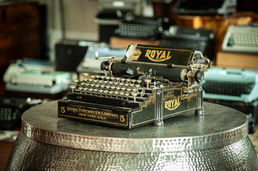File this under
Stuff:
Typewriting:
Or, learning to think all over again.

Is it the sound typewriters make? Is it the way they look? Or is it how they face the future?
New opportunities meet old machines.

Things age, and their values ebb and flow curiously. Spot a 1930's era car and people stop and stare as it rolls by. Speak with a 1930's era person and wow! A 1930's era restored house can draw a small fortune. But pass by a 1930's era typewriter, and meh, it's just an old typewriter, to most people, anyway. The majority are dust covered with rusty parts, discolored keys and bent type bars jammed together like departing baseball fans at a difficult turnstile. Even one that's pristine gets glossed over on a shelf as a curiosity.
Maybe it's perceived usefulness that matters. Getting from point A to point B will always be a thing, so cars rank highly. History will always be revered so the elderly are fascinating. We need houses to live in so there's that. But writing? That's what the phone is for, one can simply talk at it to write something, and nobody's reading anyhow. We communicate in symbolic grunts and clicks with memes and emojis, why complicate things?
But something happened, or something is happening whereby the typewriter is gaining in popularity. Maybe it's a legitimate growing interest in the physical thing, or maybe it's a backlash against the strangling digital life. But something happened. Something is happening.
A box appeared on my doorstep in early 2021. It was heavy and not heavy, and it was from my father. I opened it, and there it was, a 1940 Royal Signet typewriter.
My first reaction was paperweight. But I pulled it out of the box, set it on the dining room table, and started playing with it. Everything worked. The keys were crisp, the carriage slid back and fourth easily, and there wasn't a scratch on it. I put a piece of paper inside, and haven't stopped hammering away on it since. Soon after I acquired a 1924 Royal Standard #10, a larger, older, and more complex machine. Three years later, and I now have 30 typewriters as seen above in the strip of typewriter images.
Googling typewriter was like Jed Clampett blasting a round at some food, and up bubbled a typewriter culture I had no idea was happening.
You may have seen Tom Hanks commenting on his collection of typewriters, but leading the charge seems to be Richard Polt, a philosophy professor at Xavier University, and author of 2015's Typewriter Revolution: A Typist's Companion for the 21st Century. Many of the myriad Instagram accounts I've found and now follow with typewriter-related content have one thing in common, a connection to Polt. Speaking with the only typewriter repairman in the Seattle area I know of (in Bremerton - BREMERTON) he gave credit to Polt for being the hub that has driven much of the revival, and as a great source for information and connection.
While Polt emphasizes the typewriter itself as a thing of beauty and history, he also sneers at many aspects of the digital life. He's no Richard Seymour, author of The Twittering Machine, with his bleak review of and dire warnings for the prevalence of social media in our lives, but . . . well, wait a minute, rereading Polt's very brief manifesto, perhaps he is more radical than I've given him credit for.
But how does a typewriter affect the way one thinks?
Well, let me start with my father was a bank robber. He was the quiet kind, the type that didn't like commotion or aggression. You're wondering what this has to do with typewriters, and I'll tell you it connects through letter writing. And we wrote a lot of letters back and fourth.
My father wrote with pen and paper, usually on yellow legal pads, and so I felt obliged to do the same, mostly. Starting in the early 80s I didn't always have access to computers, and typewriters required some kind of stability, a table, or at least a typewriter. And to a kid? A typewriter? And so over many years we communicated by writing on paper, cursive sometimes, printing at others.
Skip ahead for a moment and think how writing on a computer means self-editing in real time. For every 25 words you write, you may reread 20 and rewrite 15. (Dammit, I'm doing it now. ) For every minute you spend moving forward writing, you may spend half of that reshaping what's already behind you. Imagine driving and stopping at every house to see if that's the one you're looking for, or turning around to see if you've passed it, or looking to see if there's a more interesting house and family to visit instead of where and who you were going to see in the first place, or hitting a side street because you forgot where you were going altogether because every street is a viable option.
But writing on paper, or typing straight to paper gives the writer or typist very little of that. You're on the road, and you've committed to the road you're driving. U-turns are awkward, abrupt stops uncomfortable, detours consuming, and so a typing writer learns to pick a direction, and commit. And if by chance you do veer off course, getting back on track requires a kind of thinking not encouraged with non-linear digital smearing. It requires brainwork, and I can feel it when it happens.
Just in the four paragraphs above (four when I first wrote this, now I don't know how many with all the squirreling around), I can feel the dizzying confusion of scrubbing up and down with my eyes, trained to do so by the non-linear nature of digital text. Digital text isn't words, but a greasy fluid that runs and drips and hates itself and can't wait to be turned into what it thinks will be better but it's never satisfied. And what it lacks is commitment, the kind those many letters between me and my father had.
"Dear Pops, I failed a class this semester. . ." "Dad, I'm working at a ski resort. . ." "Yo Hank! What do you mean you're in solitary confinement. . ." I picked a topic, and I thought through it with conviction. Conviction on my terms. In the digital world, who's convictions are you following? Amazon's? Apple's? OfferUp's? Tindr's? Facebook's?
Well, I don't want to get caught in the weeds here. I see and make my living from the more useful aspects of the Internet. But people will tell you, Anthony is all about the content.

Doug and Queen Victoria stay front and center at my end of the dining room table, at all times. When I have time or a thought, I'll sit and write until I'm pulled away. If I don't have time or a thought, I'll sit and write until I'm pulled away. Why?
John Barnes, author of One For The Morning Glory, and Encounter With Tibor, asked me once to take his class on creative writing. I told him I'm chock full of writing credits, and he told me this one would be different, and it was. On the first day of class he thinned the herd by saying this was a class about the business of writing, to learn to write when you don't want to write, to be rejected, and to keep writing. None of my computers today seem to subscribe to that. But Doug and Queen V are like horses I can hear breathing and feel sweating. They buck and they stomp and snort and they encourage me to keep going. And if they can take it, I can take it. If typewriters can take it, then we can take it.
Maybe that's what happened. Maybe that's what's happening.
























